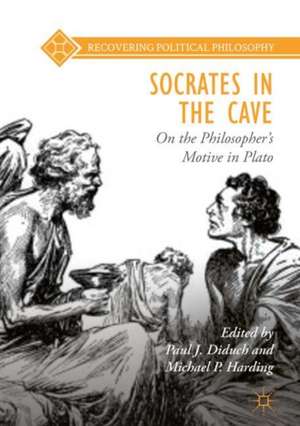Socrates in the Cave: On the Philosopher’s Motive in Plato: Recovering Political Philosophy
Editat de Paul J. Diduch, Michael P. Hardingen Limba Engleză Hardback – 31 mai 2018
| Toate formatele și edițiile | Preț | Express |
|---|---|---|
| Paperback (1) | 781.77 lei 6-8 săpt. | |
| Springer International Publishing – 24 ian 2019 | 781.77 lei 6-8 săpt. | |
| Hardback (1) | 786.98 lei 6-8 săpt. | |
| Springer International Publishing – 31 mai 2018 | 786.98 lei 6-8 săpt. |
Din seria Recovering Political Philosophy
-
 Preț: 382.95 lei
Preț: 382.95 lei -
 Preț: 382.75 lei
Preț: 382.75 lei -
 Preț: 386.61 lei
Preț: 386.61 lei -
 Preț: 384.86 lei
Preț: 384.86 lei -
 Preț: 357.43 lei
Preț: 357.43 lei - 15%
 Preț: 702.24 lei
Preț: 702.24 lei - 18%
 Preț: 726.06 lei
Preț: 726.06 lei -
 Preț: 382.75 lei
Preț: 382.75 lei -
 Preț: 386.81 lei
Preț: 386.81 lei -
 Preț: 265.36 lei
Preț: 265.36 lei -
 Preț: 211.29 lei
Preț: 211.29 lei - 15%
 Preț: 646.75 lei
Preț: 646.75 lei - 18%
 Preț: 728.28 lei
Preț: 728.28 lei - 8%
 Preț: 487.95 lei
Preț: 487.95 lei - 15%
 Preț: 641.71 lei
Preț: 641.71 lei -
 Preț: 201.06 lei
Preț: 201.06 lei -
 Preț: 214.57 lei
Preț: 214.57 lei - 15%
 Preț: 579.20 lei
Preț: 579.20 lei -
 Preț: 176.74 lei
Preț: 176.74 lei - 15%
 Preț: 577.07 lei
Preț: 577.07 lei - 15%
 Preț: 583.61 lei
Preț: 583.61 lei - 18%
 Preț: 777.20 lei
Preț: 777.20 lei - 15%
 Preț: 693.57 lei
Preț: 693.57 lei - 15%
 Preț: 698.30 lei
Preț: 698.30 lei - 18%
 Preț: 727.97 lei
Preț: 727.97 lei - 18%
 Preț: 786.18 lei
Preț: 786.18 lei -

Preț: 786.98 lei
Preț vechi: 959.72 lei
-18% Nou
Puncte Express: 1180
Preț estimativ în valută:
150.58€ • 157.24$ • 124.35£
150.58€ • 157.24$ • 124.35£
Carte tipărită la comandă
Livrare economică 15-29 aprilie
Preluare comenzi: 021 569.72.76
Specificații
ISBN-13: 9783319768304
ISBN-10: 3319768301
Pagini: 354
Ilustrații: XIV, 347 p.
Dimensiuni: 148 x 210 x 28 mm
Greutate: 0.59 kg
Ediția:1st ed. 2019
Editura: Springer International Publishing
Colecția Palgrave Macmillan
Seria Recovering Political Philosophy
Locul publicării:Cham, Switzerland
ISBN-10: 3319768301
Pagini: 354
Ilustrații: XIV, 347 p.
Dimensiuni: 148 x 210 x 28 mm
Greutate: 0.59 kg
Ediția:1st ed. 2019
Editura: Springer International Publishing
Colecția Palgrave Macmillan
Seria Recovering Political Philosophy
Locul publicării:Cham, Switzerland
Cuprins
1. Editors' Introduction.- 2. The Strange Conversation of Plato’s Minos.- 3. Platonic Beginnings.- 4. A Look at Socrates’ Motives in the Laches.- 5. Socrates’ Self-Knowledge.- 6. Socrates’ Exhortation to Follow the Logos.- 7. Philosophy, Eros, and the Socratic Turn.- 8. Free to Care: Socrates’ Political Engagement.- 10. Socrates: Sisyphean or Overflowing?.- 11. Socrates’ Motives and Human Wisdom in Plato’s Theages.- 12. Plato’s Euthyphro on Divine and Human Wisdom.- 13. On the Question of Socratic Benevolence.- 14. Philanthropy in the Action of the Euthyphro, Apology, and Crito.- 15. Philosophic Care in the Life of Plato’s Socrates.- 16. Plato’s Sons and the Library of Magnesia.
Notă biografică
Paul J. Diduch is an Instructor in the Herbst Program of Humanities for Engineers at the University of Colorado Boulder, USA. He has published articles and reviews on Plato and Thucydides and is currently working on Socrates’ critique of pre-Socratic science and the problems of virtue and knowledge in Plato’s thought.
Michael P. Harding is an Associate Professor of Philosophy and Political Science at Montgomery College, USA. He earned his doctorate from the Institute of Philosophic Studies at the University of Dallas, USA.
Textul de pe ultima copertă
This book addresses the problem of fully explaining Socrates’ motives for philosophic interlocution in Plato’s dialogues. Why, for instance, does Socrates talk to many philosophically immature and seemingly incapable interlocutors? Are his motives in these cases moral, prudential, erotic, pedagogic, or intellectual? In any one case, can Socrates’ reasons for engaging an unlikely interlocutor be explained fully on the grounds of intellectual self-interest (i.e., the promise of advancing his own wisdom)? Or does his activity, including his self-presentation and staging of his death, require additional motives for adequate explanation? Finally, how, if at all, does our conception of Socrates’ motives help illuminate our understanding of the life of reason as Plato presents it? By inviting a multitude of authors to contribute their thoughts on these question—all of whom share a commitment to close reading, but by no means agree on the meaning of Plato’s dialogues—this book provides the reader with an excellent map of the terrain of these problems and aims to help the student of Plato clarify the tensions involved, showing especially how each major stance on Socrates entails problematic assumptions that prompt further critical reflection.
Caracteristici
Collects Plato scholars from across philosophy and political theory Engages the question of Socrates’ putative “philanthropy” or care for others Rereads Plato's works to provide new insights into Socrates' motives for philosophic interlocution
